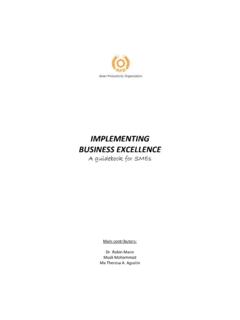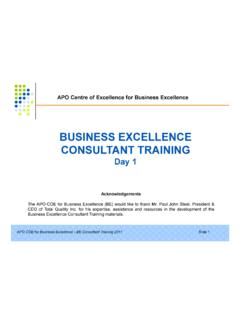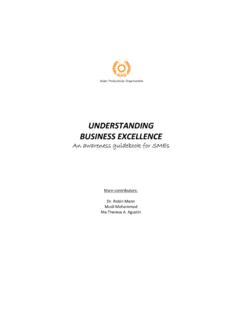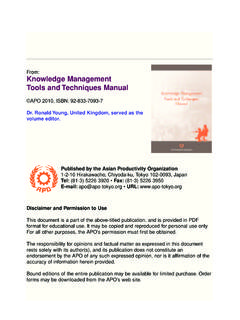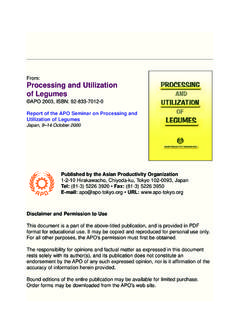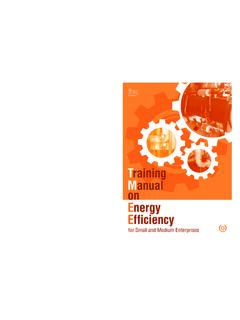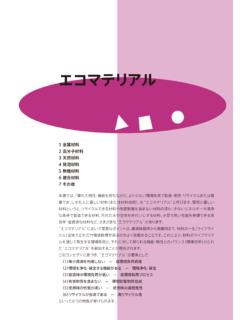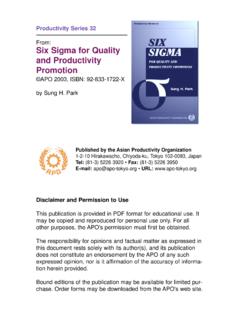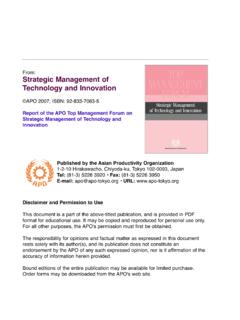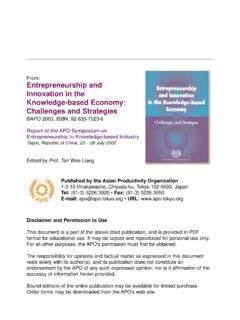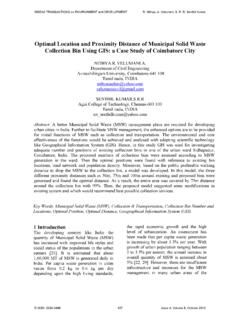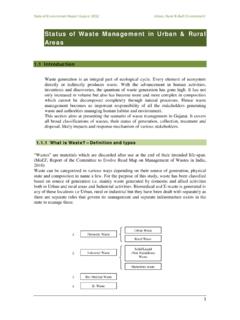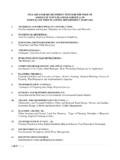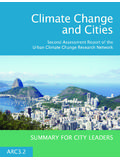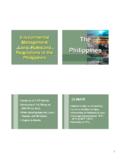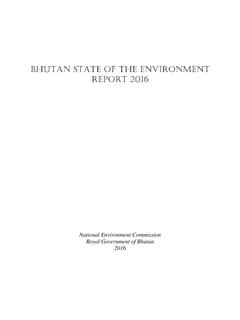Transcription of Solid Waste Management: Issues and Challenges …
1 From: Solid Waste management : Issues and Challenges in Asia APO 2007, ISBN: 92-833-7058-9 Report of the APO Survey on Solid -WasteManagement 2004 05 Edited by the Environmental management Centre,Mumbai, IndiaPublished by the Asian Productivity Organization1-2-10 Hirakawacho, Chiyoda-ku, Tokyo 102-0093, JapanTel: (81-3) 5226 3920 Fax: (81-3) 5226 3950E-mail: URL: and Permission to UseThis document is a part of the above-titled publication, and is provided in PDFformat for educational use. It may be copied and reproduced for personal use all other purposes, the APO's permission must first be responsibility for opinions and factual matter as expressed in this documentrests solely with its author(s), and its publication does not constitute anendorsement by the APO of any such expressed opinion, nor is it affirmation of theaccuracy of information herein editions of the entire publication may be available for limited forms may be downloaded from the APO's web of the APO Survey on Solid - Waste management 2004 05 Environmental management Centre, Mumbai, India, served as the volume opinions expressed in this publication do not reflect the official view of the AsianProductivity Organization.
2 For reproduction of the contents in part or in full, the APO s priorpermission is required. Asian Productivity Organization, 2007 ISBN: vPart IOverview of Solid - Waste Managementin Asian Joo 3 Part IIGreen Productivity Approaches to SWM:Turning Waste into 11 Part IIIN ational Reports1. Bangladesh ..G. M. Jainal Abedin 192. Republic of China ..Hsiao-Hsin 323. India ..Dass 624. Islamic Republic of Iran ..Dr. Mohammad Ali 925. Malaysia ..Dr. Goh Ban 1186. Nepal ..Bhushan 1427. Philippines ..Danilo G. 1878. Singapore ..Cheong Hock 2269. Sri Lanka ..Thercy Devika 24610. Thailand ..Chawalit 27411. Vietnam ..Hoang Viet 298 Part IVAppendixes1. List of Experts .. 3312. List of Abbreviations and Acronyms .. 335 FOREWORDOne of the most obvious impacts of rapidly increasing urbanization and economic developmentcan be witnessed in the form of heaps of municipal Solid Waste .
3 Based on estimates, wastegeneration in Asia has reached 1 million tons per day. A World Bank study showed that urbanareas in Asia spent USD25 million per year on Solid - Waste management , and this figure willincrease to USD47 million per year. Despite the huge expenditures, urban areas in most APOmember countries are still grappling with the challenge of preventing environmental degrada-tion due to nonsystematic Solid - Waste management . Apart from the contamination of waterresources and severe air pollution due to the open burning of Solid Waste , the health hazard isanother key issue to be addressed. Solid - Waste management has become an important issue inthe Asia-Pacific region, and it needs to be resolved through an integrated community, private-sector, and policy-based recognizing the significance of Solid - Waste management , the APO has been organiz-ing multicountry workshops, seminars, and conferences to discuss related Issues and problemsin member countries and devise solutions.
4 A survey was conducted on Solid - Waste managementin 11 APO member countries: Bangladesh, Republic of China, India, Islamic Republic of Iran,Malaysia, Nepal, Philippines, Singapore, Sri Lanka, Thailand, and Vietnam to assess currentsolid- Waste management practices and to highlight Issues , problems, and the initiatives under-taken to tackle them. This survey was also an attempt to create a consolidated database onsolid Waste that can be utilized for planning purposes at the national level and for strategyformulation for regional APO has been promoting Green Productivity, , the integration of productivityenhancement and environmental protection, as a method for sustainable socioeconomic devel-opment, which can help member countries adopt simple, down-to-earth measures for system-atic Solid - Waste management . This survey also encompassed such endeavors and activitiesundertaken by the target volume contains information collected during the survey on Solid - Waste managementin the 11 countries, including Waste -generation profiles, regulatory frameworks, Solid -wastemanagement governance, Waste -collection and disposal mechanisms, Green Productivity activi-ties, etc.
5 I hope that this publication will be useful for policymakers, planners, and Solid - Waste - management professionals, giving them a better insight into the Issues involved and developinga perspective for addressing TakenakaSecretary-GeneralTokyoAugust 2007 OVERVIEW OF Solid - Waste MANAGEMENTIN ASIAN COUNTRIESTay Joo HwaDirector and CEOI nstitute of Environmental Science & EngineeringNanyang Technological UniversitySingaporeBACKGROUNDS olid- Waste management is a major challenge in urban areas throughout the world. Without aneffective and efficient Solid - Waste management program, the Waste generated from varioushuman activities, both industrial and domestic, can result in health hazards and have a negativeimpact on the environment. Understanding the Waste generated, the availability of resources,and the environmental conditions of a particular society are important to developing an appro-priate Waste - management management may be defined as the discipline associated with controlling thegeneration, storage, collection, transfer and transport, processing, and disposal of Solid wastein a manner that is in accordance with the best principles of health, economics, engineering,conservation, aesthetics, and other environmental considerations, and that is also responsive topublic attitudes.
6 In its scope, Solid - Waste management includes all administrative, financial,legal, planning, and engineering functions involved in the solutions to all problems of solidwaste. The solutions may involve complex interdisciplinary fields such as political science,city and regional planning, geography, economics, public health, sociology, demography, com-munications, and conservation, as well engineering and materials instance, if Waste is wet or has a low heating value, it would not be possible toincinerate it without adding supplemental fuel. If a portion of the Waste stream consists oforganics and can be easily separated from other Waste materials, bioconversion of the wastemay become a viable strategy. On the other hand, the Waste generated by industrialized coun-tries may be different from those generated by nonindustrialized countries. Nonindustrializedsocieties may have more organic Waste than those generated by industrialized countries.
7 Ifthis is the case, composting or anaerobic digestion may be more suitable for organic activities associated with managing Solid Waste from the generation point to finaldisposal normally include generation, reduction, reuse, recycling, handling, collection, transferand transport, transformation ( , recovery and treatment), and disposal. Depending on site-specific conditions, a sound Waste - management program can be established by combining someof the necessary activities into integrated Solid - Waste management . On the other hand, legisla-tive efforts and effective implementation are vital for the safe management and disposal ofsolid Waste . Incentives may be provided for the development and practice of safe treatments,harmless manufacturing processes, and methods for converting Solid Waste into valuable re-sources by recycling and reuse. On the part of industry, industrial Waste - management is alsoindispensable from the viewpoint of both the social responsibility of business corporations andISO 14000, which will influence their survival in global the above background in view, the fact-finding survey has been conducted to 3 Solid - Waste Managementstudy the current situation, major problems, and techno-managerial practices on Solid -wastemanagement in the member countries.
8 It is the purpose of this APO project to gather Solid - Waste management information from member countries to develop a combination of processesand innovative approaches to manage and treat the Solid - Waste stream. Eleven APO membercountries participated and completed the survey studies: Bangladesh, the Republic of China,India, the Islamic Republic of Iran, Malaysia, Nepal, Philippines, Singapore, Sri Lanka, Thai-land, and Vietnam. This paper presents the findings of the survey study on Solid - Waste manage-ment in these 11 member objectives of the survey study are:1. To study the current situation and major problems in member countries in the genera-tion, reduction, reuse, recycling, handling, collection, transfer and transport, transforma-tion ( , recovery and treatment), and disposal of Solid Waste ;2. To gain information on the prevailing technologies and practices of Solid - Waste manage-ment collection, transformation, and disposal;3.
9 To study ways and means to manage Solid Waste for reduction, reuse, recycling, andrecovery; and4. To explore policy measures and industrial actions to minimize the undesirable impactsgenerated by Solid management POLICY AND LEGISLATIONThe 11 participating member countries in this project have established legislation for environ-mental protection. Most of these countries have also set up different ministries to handle theenvironmental Issues . The legislation for water- and air-pollution control are comprehensiveand well established, but not for Solid - Waste management . Solid - Waste management is stillvery much a municipal government responsibility. A long-term strategy on Solid - Waste man-agement is still lacking in the developing Asian many other developing countries in the world, concerns in the region are growing inboth the governmental and public sectors for an effective and economic management of solidwaste.
10 The lack of awareness, technical knowledge, legislation, policies, and long-term strategyare major Issues for Solid - Waste management in Asian developing AND QUANTITIES OF Solid - Waste MANAGEMENTIn the purview of management and legal aspects, Solid Waste in Asian countries can be broadlydefined as Waste other than liquid or gaseous Waste . The sources and quantities of Solid wastedepend on various factors such as economics, culture, heritage, industrialization, and sources of Solid Waste include: domestic Waste , commercial Waste , hospital Waste , andhazardous amount of Solid Waste generated in the cities is much higher than in rural areas. Thegeneration rate in rural areas can be as low as kg/cap/day, while in the urban areas the 4 OverviewTable : Solid - Waste Generation Rates of Major Asian CitiesGeneration rateCityCountry(kg/cap/day) Republic of of can be above kg/cap/day.
